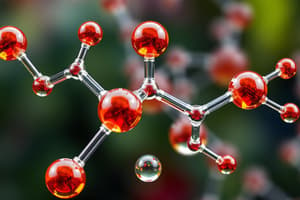Podcast
Questions and Answers
What is the main focus of organic chemistry?
What is the main focus of organic chemistry?
- Study of metal coordination complexes
- Study of carbon-containing compounds (correct)
- Study of non-carbon compounds
- Study of energy changes in chemical reactions
Which type of isomerism involves compounds with the same molecular formula but different arrangements of atoms?
Which type of isomerism involves compounds with the same molecular formula but different arrangements of atoms?
- Structural isomerism (correct)
- Geometric isomerism
- Enantiomeric isomerism
- Stereoisomerism
What defines a coordination compound in inorganic chemistry?
What defines a coordination compound in inorganic chemistry?
- Compounds that are gases at room temperature
- Compounds that contain organic functional groups
- Compounds with a central metal atom and surrounding ligands (correct)
- Compounds with carbon-hydrogen bonds
In physical chemistry, which concept relates to studying energy changes during chemical reactions?
In physical chemistry, which concept relates to studying energy changes during chemical reactions?
Which of the following biomolecules is involved in catalyzing biochemical reactions?
Which of the following biomolecules is involved in catalyzing biochemical reactions?
What does quantitative analysis in analytical chemistry measure?
What does quantitative analysis in analytical chemistry measure?
Which of the following bonds is characterized by the transfer of electrons?
Which of the following bonds is characterized by the transfer of electrons?
What is the primary role of nucleic acids in biochemistry?
What is the primary role of nucleic acids in biochemistry?
Flashcards are hidden until you start studying
Study Notes
Organic Chemistry
- Definition: Study of carbon-containing compounds and their properties.
- Key Concepts:
- Structural formulas: Represent molecular structures.
- Functional groups: Specific groups of atoms that determine the characteristics of compounds (e.g., alcohols, carboxylic acids).
- Isomerism: Compounds with the same molecular formula but different structures (e.g., structural, geometric, and enantiomeric isomers).
- Reactions: Common types include substitution, addition, elimination, and rearrangement.
Inorganic Chemistry
- Definition: Study of inorganic compounds, typically those not containing carbon-hydrogen bonds.
- Key Concepts:
- Coordination compounds: Complexes formed from a central metal atom and surrounding ligands.
- Oxidation states: Concept to describe the degree of oxidation of an atom.
- Periodic trends: Changes in properties (e.g., electronegativity, atomic size) across periods and groups in the periodic table.
- Types of bonding: Ionic, covalent, and metallic bonds.
Physical Chemistry
- Definition: Study of the physical properties and behavior of chemical systems.
- Key Concepts:
- Thermodynamics: Study of energy changes during chemical reactions (laws of thermodynamics).
- Kinetics: Study of reaction rates and the factors affecting them.
- Quantum chemistry: Application of quantum mechanics to chemical systems.
- Chemical equilibrium: Condition where reactants and products are in a constant ratio over time.
Biochemistry
- Definition: Study of chemical processes within and related to living organisms.
- Key Concepts:
- Macromolecules: Proteins, nucleic acids, carbohydrates, and lipids and their roles in biological functions.
- Enzymes: Biological catalysts that accelerate biochemical reactions.
- Metabolism: Sum of all chemical reactions in a biological system; includes catabolism and anabolism.
- Genetic information: Role of DNA and RNA in heredity and protein synthesis.
Analytical Chemistry
- Definition: Study of the techniques and methods used to analyze substances.
- Key Concepts:
- Qualitative analysis: Determining the presence of chemical constituents.
- Quantitative analysis: Measuring the amount or concentration of a substance.
- Instrumental methods: Techniques such as chromatography, spectroscopy, and mass spectrometry.
- Calibration and standardization: Ensures accuracy and precision in analytical measurements.
Organic Chemistry
- Involves the study of carbon-based compounds and their diverse properties.
- Structural formulas depict the arrangement of atoms within molecules, crucial for understanding reactivity.
- Functional groups, such as alcohols and carboxylic acids, dictate the chemical behavior and properties of organic compounds.
- Isomerism allows for variations in structure despite identical molecular formulas, including structural, geometric, and enantiomeric isomers.
- Reaction types encompass substitution, addition, elimination, and rearrangement processes, fundamental in organic synthesis.
Inorganic Chemistry
- Focuses on inorganic compounds, primarily those lacking carbon-hydrogen bonds.
- Coordination compounds are formed around a central metal atom, interacting with surrounding ligands, impacting their properties.
- Oxidation states indicate the extent of an atom's oxidation, essential for understanding redox reactions.
- Periodic trends describe the systematic changes in characteristics like electronegativity and atomic size across groups and periods in the periodic table.
- Types of bonding include ionic (electron transfer), covalent (electron sharing), and metallic bonds (delocalized electrons).
Physical Chemistry
- Encompasses the physical aspects and behaviors that govern chemical processes and systems.
- Thermodynamics involves understanding energy changes during chemical reactions, governed by established laws.
- Kinetics studies the rates of reactions and factors that influence them, crucial for reaction mechanism understanding.
- Quantum chemistry applies quantum mechanics principles to elucidate the behavior of chemical systems at a molecular level.
- Chemical equilibrium refers to the state where reactants and products maintain a constant ratio over time, vital for reversible reactions.
Biochemistry
- Examines the chemical processes integral to living organisms and their functions.
- Macromolecules, including proteins, nucleic acids, carbohydrates, and lipids, perform critical biological roles.
- Enzymes act as biological catalysts, significantly speeding up biochemical reactions essential for life.
- Metabolism encompasses all chemical reactions in a biological context, divided into catabolic (breakdown) and anabolic (building up) pathways.
- Genetic information is stored and transmitted through DNA and RNA, playing a pivotal role in heredity and protein synthesis.
Analytical Chemistry
- Investigates the methods and techniques used for substance analysis.
- Qualitative analysis identifies the presence of specific chemical constituents in a sample.
- Quantitative analysis measures the concentration or amount of a substance, providing numerical data for chemical composition.
- Instrumental methods such as chromatography, spectroscopy, and mass spectrometry are key techniques for analysis, offering precision and detail.
- Calibration and standardization are vital processes that ensure accuracy and reliability in analytical measurements.
Studying That Suits You
Use AI to generate personalized quizzes and flashcards to suit your learning preferences.




